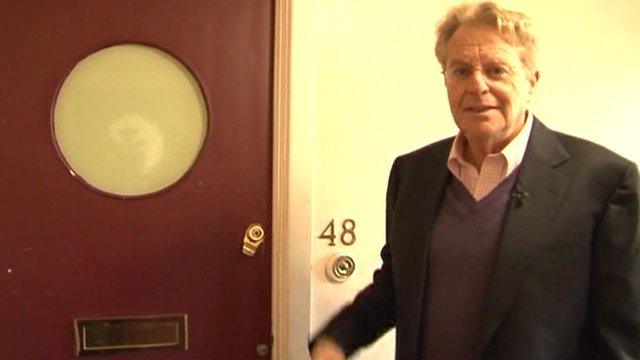Jerry Springer - godfather of reality TV
- Published
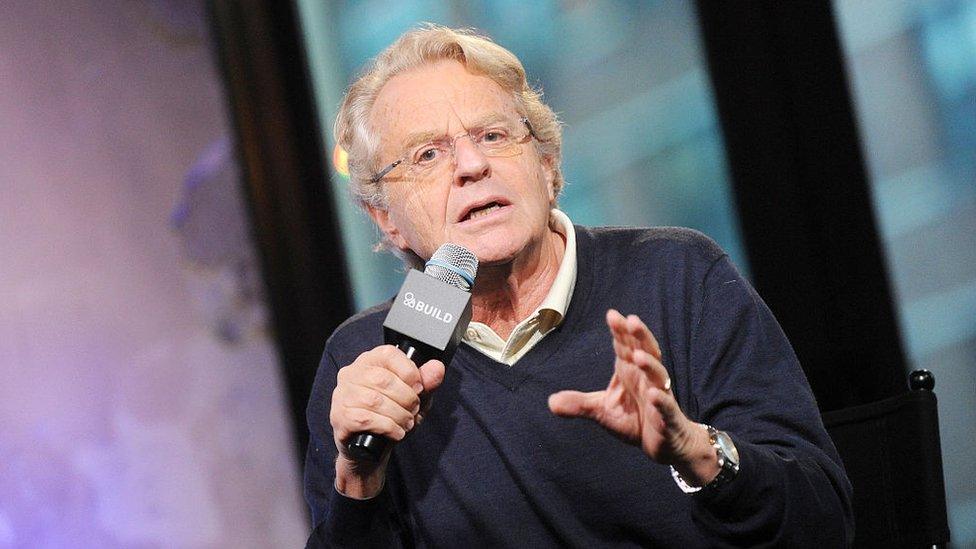
Veteran TV host Jerry Springer made his guests the butt of the joke, some observers said
Nearing the end of his 21st season on air, Jerry Springer stood between two sisters on a soundstage.
One, a stripper named Charlynne, had confessed on live television to sleeping with her sister Christina's boyfriend. The pair screamed and fought. At one point in the segment, Christina ripped out a large chunk of Charlynne's blonde weave.
Springer, bespectacled in a pink shirt and grey suit, walked over, picked up the hair and looked confused, as if he could not believe the chaos that had ensued.
But that episode, called You Slept With My Sister, was typical programming for Springer's eponymous talk show: outrageous, profane and captivating to millions of Americans, who embraced Springer even as critics dismissed the show as low-brow and exploitative. And it was that sensationalised programming, some experts say, which helped lay the foundation for today's media landscape.
"It's called the Jerry Springer effect," said journalist and psychologist Cooper Lawrence, who has written extensively on celebrity culture. "He opened the door for the idea of reality programming… for the Real Housewives and the Kardashians. He was the father of all of that."
Springer, who died on Thursday at 79 after a brief illness, served as mayor in his hometown of Cincinnati before leaving politics for journalism.
He joined Cincinnati station WLWT-TV and went on to launch The Jerry Springer Show in 1991. Initially, it was a serious, issue-based programme. The Los Angeles Times called it, external an "oppressively self-important talk hour starring a Cincinnati news anchorman and former mayor".
But within a couple of years, the show had transformed. For Springer's 27 seasons and nearly 5,000 episodes, physical violence, sex and lurid drama took centre stage, with episode titles like Trailer Park Queen Hoedown, Maid of Honor Sleeps with the Groom and Pimping Out My Lover's Cousin.
The Jerry Springer Show became a ratings powerhouse, with viewership peaking in 1998 at about eight million, at one time topping The Oprah Winfrey Show.
"Jerry was beloved… He was showing real people doing real things," Lawrence said. "Oprah had Tom Cruise jumping on the coach, Jerry had the man who cut off his own penis. I'd rather know why that guy castrated himself, I don't care about Tom Cruise."
Some now draw a line from that central premise of Springer's show - showing real people doing real things - to the reality show hits of today, popular programmes like the Real Housewives franchise, Love is Blind and Married at First Sight.
"People look at Jerry Springer's show and say, 'Oh those people are trash, they punched each other and threw chairs at each other'. The Real Housewives, these millionaires, are doing the exact same thing," Lawrence said.
But Springer's legacy also includes the racist, homophobic, transphobic and misogynistic stereotypes that his show often played into.
"Springer allowed American television to move toward an acceptance of poverty and bigotry and misogyny as not problems to be solved but personal foibles that other people should mock and parody," said Jennifer Pozner, media critic and author of Reality Bites Back. Vulnerable people were used as the "butt of the joke", she said.
Springer himself sometimes sought to distance himself from the show.
"I've always said it's stupid. It's just camp. It's chewing gum. It's an hour of escapism. It has no real value," he once said.
But despite his sometimes harmful content, the veteran host managed to avoid any form of cancellation. After The Jerry Springer Show was taken off air, he joined the cast of Dancing With The Stars and served as host for America's Got Talent.
"The Jerry Springer show is a product of a particular time when mainstream network television considered it extremely appropriate to bandy about bigotry and misogyny," Pozner said. "There is a different kind of awareness among the general public now that certain types of things are not socially acceptable, if you're a decent person."
Springer may also have been saved by the absence of social media, she said. His reign came years before media consumers had direct contact with media creators.
"Social media has created a pipeline for average viewers to be able to speak back to media producers," Pozner said.
"In 1991, if you didn't like something you saw on Jerry Springer, you said it to your television. And it didn't hear you."
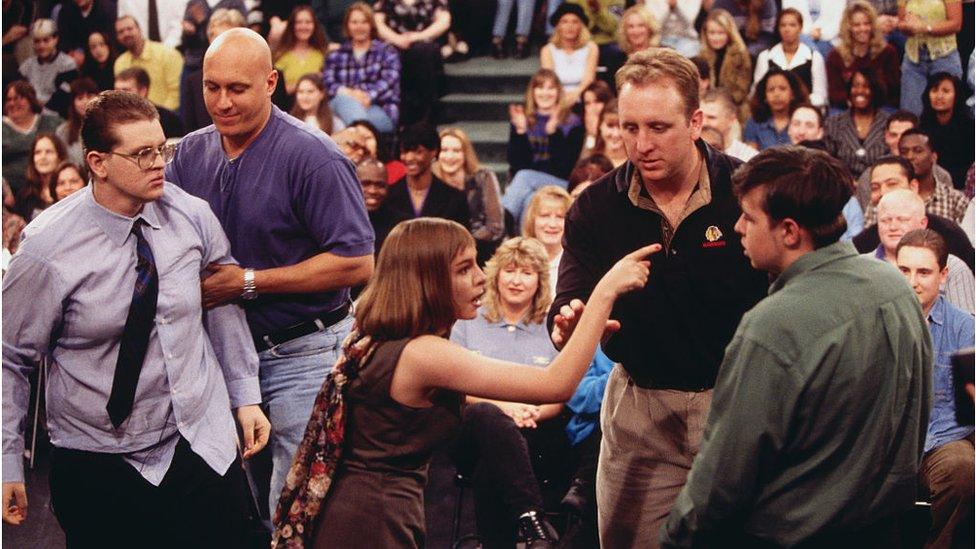
Security guards separating guests on an episode of The Jerry Springer Show
Related topics
- Published27 April 2023
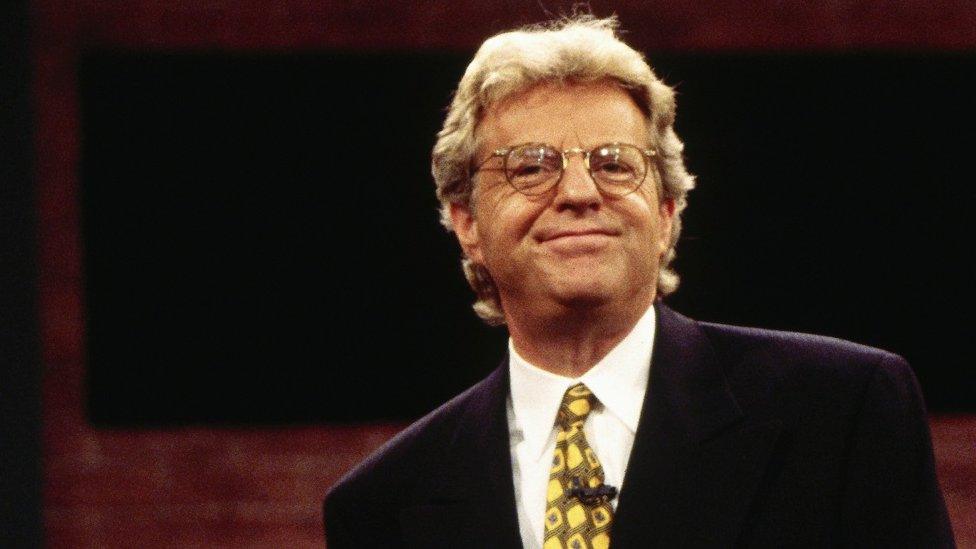
- Published27 April 2023
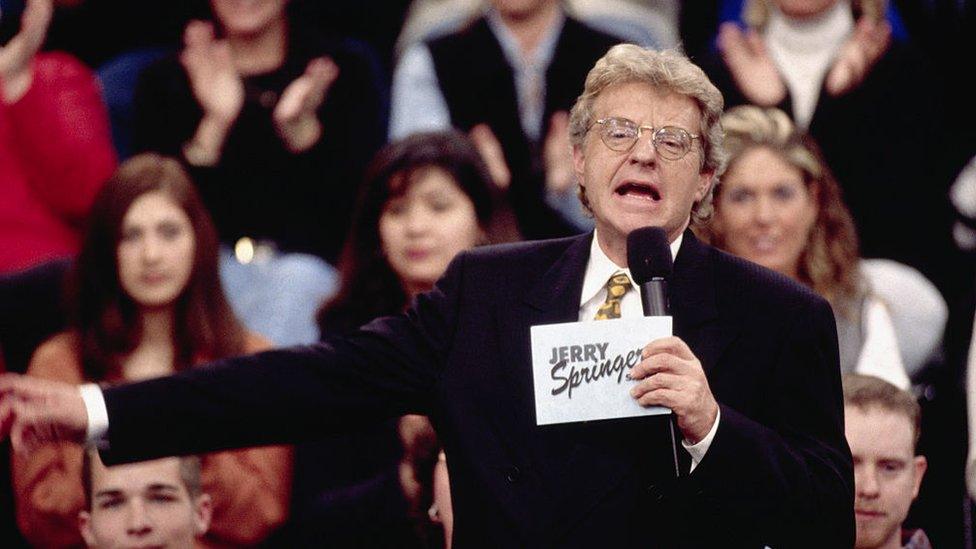
- Published28 May 2012
